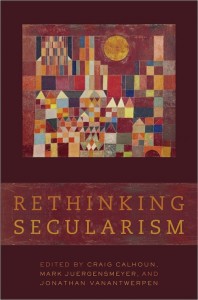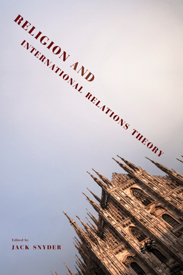
 On October 21, at the School of Oriental and African Studies in London, an interdisciplinary group of scholars from Europe, India, and the United States met for a workshop, “Shared Sovereignty: Rights, Religion and the Problem of Authority,” organized by Leslie Vinjamuri, Matt Nelson, Stephen Hopgood, and Rochana Bajpai. The workshop, hosted by the Centre for the International Politics of Conflict, Rights and Justice together with the Human Rights Consortium, looked at how notions of sovereignty are negotiated and, then, shared (or not) in spaces where authority is contested. The workshop examined the politics through which secular and religious actors embrace, manipulate, adapt, or negotiate agreements for claiming, controlling, or collaborating in shared spaces. The workshop began with a public roundtable with speakers Azza Karam (UNFPA), Jack Snyder (Columbia University), and Jonathan VanAntwerpen (SSRC) that highlighted two recent significant contributions to the study of religion and politics, Rethinking Secularism, and Religion and International Relations Theory.
On October 21, at the School of Oriental and African Studies in London, an interdisciplinary group of scholars from Europe, India, and the United States met for a workshop, “Shared Sovereignty: Rights, Religion and the Problem of Authority,” organized by Leslie Vinjamuri, Matt Nelson, Stephen Hopgood, and Rochana Bajpai. The workshop, hosted by the Centre for the International Politics of Conflict, Rights and Justice together with the Human Rights Consortium, looked at how notions of sovereignty are negotiated and, then, shared (or not) in spaces where authority is contested. The workshop examined the politics through which secular and religious actors embrace, manipulate, adapt, or negotiate agreements for claiming, controlling, or collaborating in shared spaces. The workshop began with a public roundtable with speakers Azza Karam (UNFPA), Jack Snyder (Columbia University), and Jonathan VanAntwerpen (SSRC) that highlighted two recent significant contributions to the study of religion and politics, Rethinking Secularism, and Religion and International Relations Theory.
At the day-long workshop scholars debated the significance of secularism when claims to authority are highly contested. Jack Snyder developed a schematic for understanding where contestation among religious and state actors was likely to be most intense, while Mashood Baderin outlined three conceptions of the relationship between religion and human rights—separation, accommodation, and ‘double-edged’ (as a via media between religion and human rights). This latter approach had interesting parallels with Rajeev Bhargava’s outline of four forms of secularism, drawn in part from his reflections on the Indian experience: one-sided exclusion, mutual exclusion, preference, and principled distance. In other contributions Jonathan VanAntwerpen took a conceptual look at what he termed interstitial spaces, that is ‘shared spaces of social relations’ by examining the boundaries and intersections of various fields and forms of thinking. The relationship between shared conceptual and shared physical space was an important question here. He was followed by Azza Karam’s discussion of the political relations between UN agencies and religious organizations, particularly in areas like health, education, and population where religious service providers are a major part of global provision. As a complement to Bhargava, Ben Fortna discussed the Millet system and its role in handling issues of religious authority and power in the transition from the Ottoman Empire to the Turkish Republic. Finally, Tariq Ramadan considered the barriers to advocating for human rights from the perspective of Islam, making the point that even to use a term like ‘secular’ was already to talk from within a tradition which many in Islamic-majority societies as well as other communities, would find controversial. He made the argument, drawing on Regis Debray, that under globalization, banning headscarves might necessitate also banning the wearing of Nike and Coca-Cola brands. This raised the issue of secular religiosity alongside important questions of toleration.
The next phase of the project will build on the various insights from this workshop to develop a broader research agenda and publication about the triangular relationship between sovereignty, rights, and religion in theoretical and empirical terms. Contested authority, and its political implications, will be a feature of global politics in the decades to come and this project will assist in furthering the consideration of the critical issues that involves.












